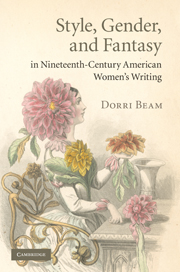Book contents
- Frontmatter
- Contents
- Acknowledgements
- Introduction. Highly wrought style
- 1 Florid fantasies: Fuller, Stephens, and the “other” language of flowers
- 2 Sensing the soul: mesmerism, feminism, and highly wrought fiction
- 3 Harriet Prescott Spofford's philosophy of composition
- 4 Pauline Hopkins' baroque folds: the styled form of Winona
- Coda: The value of ornament: Gilman and Wharton
- Notes
- Bibliography
- Index
Introduction. Highly wrought style
Published online by Cambridge University Press: 05 October 2010
- Frontmatter
- Contents
- Acknowledgements
- Introduction. Highly wrought style
- 1 Florid fantasies: Fuller, Stephens, and the “other” language of flowers
- 2 Sensing the soul: mesmerism, feminism, and highly wrought fiction
- 3 Harriet Prescott Spofford's philosophy of composition
- 4 Pauline Hopkins' baroque folds: the styled form of Winona
- Coda: The value of ornament: Gilman and Wharton
- Notes
- Bibliography
- Index
Summary
Before my second inmost sight it stood in the trance of a summer noon. The mountain summits burned in smouldering clouds of electric crimson. The cascade fell in sheets of crystallized sunshine – trailed its glory over blistering rocks, dropping at last on the cool hearts of purple mosses which waited its coming in the humid gorges below. Again the fruits in the hands of Ceres flushed with mocking mellowness. More than ever the redolent flowers blushed above the mirrors of the fountains. Waters trickle in the throats of marble lilies – tinkled, gurgled in myriads of murmurous jets.
(Mary Clemmer, Victoire)October now. All the world swings at the top of its beauty; and those hills where we shall live, what robes of color fold them! Tawny filemot gilding the valleys, each seam and rut a scroll or arabesque, and all the year pouring out her heart's blood to flush the maples, the great empurpled granites warm with the sunshine they have drunk all summer! So I am to be married to-day, at noon. I like it best so; it is my hour.
(Harriet Prescott Spofford, The Amber Gods)This book argues for the aesthetic pleasures and feminist politics of ornament, profusion, and verbosity in nineteenth-century America by recovering a sensuous and extravagant style of writing by women that reviewers often termed “highly wrought.”
- Type
- Chapter
- Information
- Publisher: Cambridge University PressPrint publication year: 2010

